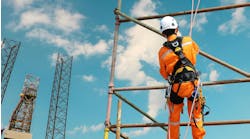Not since the early 1980s has the construction industry in the United Kingdom experienced such declines. That's the message coming out of the latest forecasts from the Construction Products Association, a London-based group representing the U.K.'s manufacturers and suppliers of construction products, components, and fixtures. Specifically, the association expects output to fall by nearly 9% in 2009 and an additional 4% in 2010.
According to Michael Ankers, CEO of the association, the speed of decline is having a dramatic effect on many parts of the construction industry and is being driven by an unprecedented reduction in private sector investment resulting from the credit crunch and economic downturn. “Private housing starts, which fell 43% in 2008, are expected to fall another 32% in 2009 to levels not seen since 1952,” he says. “Private commercial work has collapsed as the retail sector cuts back on its investment plans in the face of falling sales. Orders for new offices have fallen 47%. As a result, we are forecasting that construction output on office projects will fall by 50% over the next two years.”
The only bright spot in the forecast, explains Ankers, involves sectors where construction output is linked to public spending. For example, spending on education projects is expected to grow by 28% over the next two years. Ankers also believes activity in the health care sector will remain strong.
Although most of the statistics from the forecasts, as highlighted below, paint an overcast picture of the U.K. construction economy similar to that of the United States', a few projections promise cause for optimism.
-
New construction work to fall 10% in 2009.
-
No recovery in total construction output until 2012
-
Total housing starts (private and public) to fall to lowest level since 1924 (excluding World War II)
-
Private housing repair, maintenance, and improvement to fall 15% during 2009
-
Rail construction work to increase 190% over the next five years
-
Public non-housing construction output to rise 22% in the next two years
Not expecting a turnaround until the second half of 2010, the forecast suggests that a recovery in the United Kingdom will inevitably gather pace slowly as increasing private sector investment is offset by cutbacks in public spending and the government tries to rebalance its books, following the large increase in the borrowing requirement during the recession.


